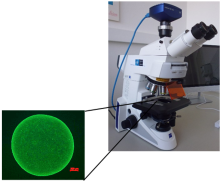
Optical biosensors have proven useful in the detection of biological systems and have led to significant advances in clinical diagnostics, drug discovery, food process control, and environmental monitoring. Without complicated pretreatment and with no likely influence on the nature of the target molecules, these biosensors have additional advantages such as high sensitivity, robustness, reliability and the potential to be integrated on a single chip.
In our group, we research and develop both fluorescence-based biosensors (as labeled biosensors) and SERS-based biosensors (as label-free biosensors) for various applications.
SERS-based biosensors are considered the standard method for label-free, real-time detection of molecules and molecular interactions. They are used wherever highly sensitive and specific analyzes are required.
We are working on the development of a universal microfluidic SERS biosensor platform containing an aerogel-coated capillary. The aerogel coating enables total reflection of the light within the capillary and therefore acts as a light guide. In addition, by introducing biofunctionalized gold nanoparticles with capture molecules into the coated capillary, an improved sensor system for detecting the desired analyte is created.
